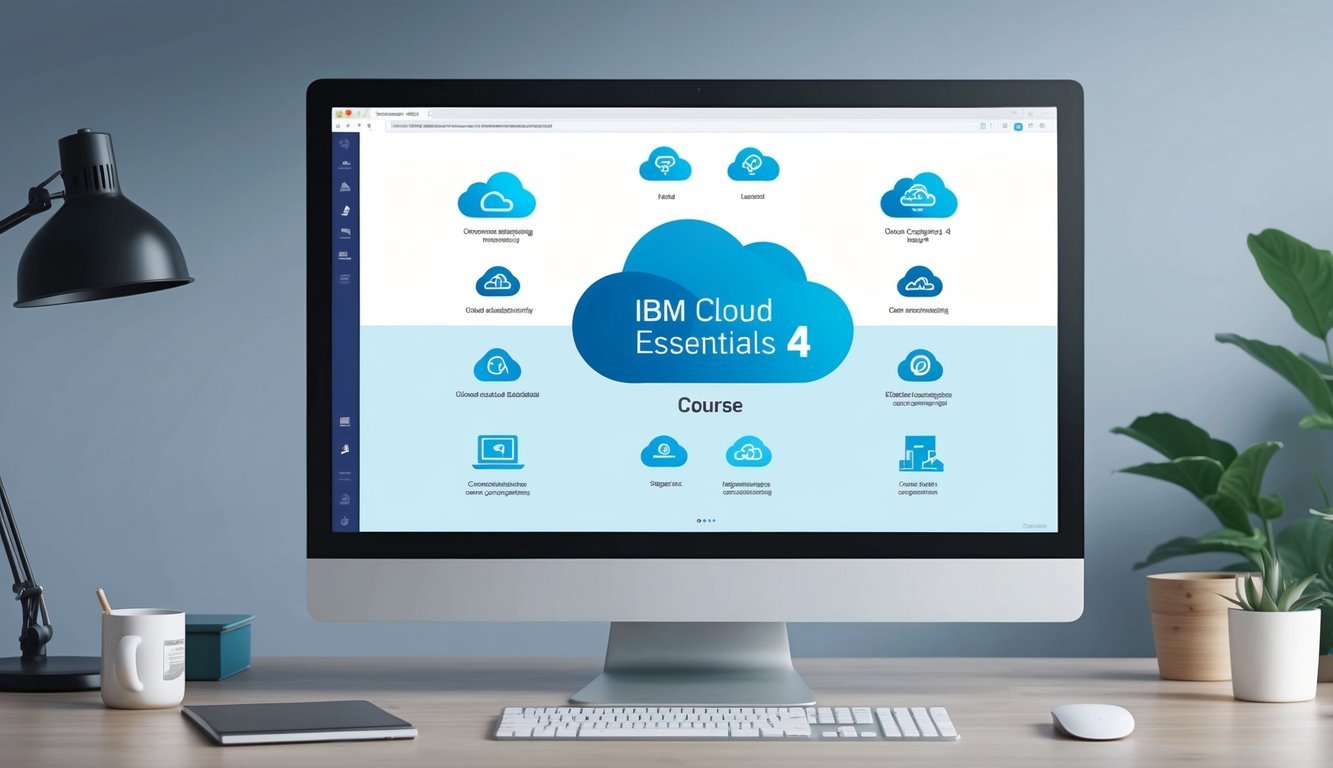Cloud computing is shaking things up in the way we work and run our businesses.
It’s like the secret sauce in today’s tech world, and if you’re curious about diving into this crucial field, you’re not alone.

There are a ton of online courses out there that can teach you the ins and outs of cloud computing.
But let’s be honest—some are definitely better than others.
The cream of the crop not only gives you hands-on experience but also covers all the essential topics.
Ready to find out which courses can help you conquer this exciting tech landscape? Let’s check out four top contenders!
1) AWS Certified Solutions Architect
If you’re itching to boost your cloud computing skills, the AWS Certified Solutions Architect course is a fantastic starting point.
It’s ideal if you’ve got a bit of IT experience and are keen to step things up.
This course guides you through designing and building systems on Amazon Web Services.
You’ll get to know key services like EC2, S3, and RDS while diving into real-world scenarios.
The best part? You can learn at your own pace.
Platforms like Coursera’s AWS Cloud Solutions Architect program make it easy to fit studying into your busy life.
After you wrap up the course, you can tackle the certification exam.
Having this certification on your resume? Total career booster! Companies are on the lookout for AWS-certified professionals.
With cloud computing skills in high demand—82% of IT decision-makers say they need them more than ever—grabbing this certification could give you serious clout in the job market.
2) Microsoft Azure Fundamentals
Just starting out in cloud computing? The Microsoft Azure Fundamentals course is a fantastic introduction.
It gives you a solid grounding in Azure’s core components and services.
You’ll learn about essentials like computing, networking, and storage, plus dive into important topics like security and cost management.
No tech-savvy required! This course is tailored for beginners.
Whether you’re new to tech or switching careers, it’s a great fit.
And guess what? You can earn a certification after you finish! The AZ-900 exam is an excellent opportunity to show off what you’ve learned.
Passing it nets you a shiny badge to flaunt.
There are plenty of flexible training options out there too—online classes, in-person sessions, or self-study.
Choose what works best for your style.
If you’re ready to jump in, the Azure Fundamentals course even features hands-on labs.
You’ll actually get to tinker with the Azure portal and command line interface.
Learning by doing? Sign me up!
3) Google Cloud Professional Data Engineer
Got your sights set on becoming a data engineering whiz? The Google Cloud Professional Data Engineer certification could be just what you need.
This course teaches you how to build and manage data processing systems using Google Cloud.
You’ll learn how to design, create, and maintain solid data solutions.
The certification covers must-know skills like data ingestion, processing, and storage.
If you’re excited about big data and machine learning, you’re gonna love this!
Worried about job prospects? Don’t be! Google Cloud certifications are among the highest-paying IT certs out there.
Plus, many certified pros find themselves moving up the career ladder.
Ready to dive in? Check out the Data Engineering, Big Data, and Machine Learning on GCP Specialization on Coursera.
It’s a stellar starting point for your certification journey.
Remember, hands-on practice is key.
The more you play around with Google Cloud, the more equipped you’ll be for both the exam and real-world challenges.
4) IBM Cloud Essentials

Want to get your feet wet with IBM Cloud? Check out the IBM Cloud Essentials course.
It’s a free online class that’ll walk you through the basics of IBM’s cloud platform.
You’ll learn how to navigate IBM Cloud services and discuss cloud concepts with confidence.
This course is perfect for newbies and can be wrapped up in less than a day.
By the end of the course, you can earn an IBM Cloud Essentials V2 badge, showcasing your understanding of IBM Cloud’s key components.
Get ready to dive into neat features like using the Cloud Foundry command-line interface and IBM Eclipse tools.
You’ll even have a chance to deploy and modify simple apps using IBM Cloud services!
The IBM Cloud Essentials course covers everything from data centers to access setup and infrastructure options.
It’s the perfect way to kick off your cloud journey with IBM.
No prior knowledge needed—just jump in!
Understanding Cloud Computing

Cloud computing is all about using computing resources via the internet.
It’s flexible, cost-effective, and scalable.
Imagine accessing apps, storage, and processing power without needing to own actual hardware—that’s cloud computing for you.
Basics of Cloud Infrastructure
Cloud infrastructure is the backbone of cloud computing.
It consists of the servers, storage, and networking components found in data centers around the globe.
You can choose from three main types of cloud services:
- Infrastructure as a Service (IaaS)
- Platform as a Service (PaaS)
- Software as a Service (SaaS)
IaaS gives you the most control.
You’re hands-on with the operating systems and apps.
PaaS provides a platform for developing and running those apps.
SaaS offers ready-to-use software you can access online.
Then there are cloud deployment models: public, private, and hybrid clouds.
Public clouds are shared among many users, while private clouds are dedicated to a single organization.
Hybrid clouds? They mix both worlds!
Importance of Cloud Services
Cloud services have completely shifted how businesses function.
Here’s why they’re a big deal:
- Cost savings: You only pay for what you use.
- Scalability: Adjust resources easily as your needs change.
- Accessibility: Work from anywhere with an internet connection.
- Automatic updates: Always have the latest features at your disposal.
No surprise here—cloud computing skills are hot on the job market.
Many positions now demand cloud expertise, which means leveling up your knowledge can really boost your career.
Cloud services power so many things we use every day, from streaming playlists to storing photos.
They enable quicker innovation and better teamwork.
Security is a big ticket item in cloud computing.
Providers use top-notch measures to keep your data safe, but you’ve got to stick to best practices as well to keep everything secure.
Criteria for Choosing Cloud Computing Courses

When you’re on the hunt for a cloud computing course, you’ll want to consider a few key factors.
The course material and the instructors are crucial pieces of the puzzle.
Let’s take a closer look.
Course Curriculum
What you learn is super important.
You want a course that covers both the foundational concepts and the latest hot topics in cloud computing.
Look for offerings that explore different cloud models like IaaS, PaaS, and SaaS.
Make sure they also include hands-on labs and real-world projects to put your knowledge into practice.
Staying up to date with the latest tools and technologies, such as containerization and orchestration, is also essential.
If you’re curious, consider checking out the top Kubernetes courses this year for a solid grasp on deploying and managing applications in cloud environments.
Hands-on practice is where the magic really happens.
Courses like those found on Coursera often include real-world projects that can enhance your learning experience.
Make sure the course includes info on the major cloud platforms—AWS, Azure, and Google Cloud.
Familiarity with these is a huge plus when you’re job hunting.
Don’t forget to check if the course touches on cloud security.
That’s a hot topic in today’s cloud landscape!
Instructor Expertise
The instructor you choose can make a world of difference.
Look for educators who have hands-on cloud experience.
They’re the ones who can share real-life stories and insights.
Check out their backgrounds.
Have they worked with big tech companies? Do they hold cloud certifications?
Good instructors keep their content fresh.
Since cloud tech is always evolving, your course should too.
The Udacity’s Cloud Developer program is known for offering up-to-date materials.
See if your instructor’s active in the cloud community.
Do they write blogs or speak at events? Being involved in the community shows they’re in tune with the latest trends.
Frequently Asked Questions

Cloud computing courses have a variety of options available.
Some focus on specific platforms, while others cover the broader concepts.
Let’s tackle some common questions you might have:
What are some highly-rated cloud computing courses for beginners?
The AWS Certified Cloud Practitioner Essentials course is fantastic for newcomers.
It covers foundational AWS concepts and is great for both techies and non-techies alike!
Microsoft Azure Fundamentals is another top pick.
It gives you a solid understanding of cloud concepts and Azure services.
Can you recommend any free cloud computing courses that offer certificates upon completion?
While many platforms have free courses, certificates often come with a fee.
The Introduction to Cloud Computing course by IBM on Coursera is free to audit, and you can opt to pay for a certificate if you wish!
Which cloud computing courses provide the most in-depth knowledge for serious learners?
If you’re serious about digging deep, check out the Google Cloud Professional Data Engineer course.
It covers advanced topics in data engineering on Google Cloud.
The AWS Certified Solutions Architect program is also comprehensive.
It dives into how to design and deploy systems on AWS.
What should I look for in a cloud computing course syllabus to ensure comprehensive coverage of the topic?
Check for a syllabus that includes cloud service models (IaaS, PaaS, SaaS), security topics, and deployment models.
A solid course should feature hands-on labs and real-world scenarios.
And don’t forget—look for courses that cover various cloud providers.
This way, you’ll gain a more comprehensive understanding of the entire field!
What makes a cloud computing course stand out as the best choice for newbies?
The best beginner courses keep things simple and clear.
They should avoid too much technical jargon upfront.
Look for courses with plenty of demos and practical exercises.
The IBM Cloud Essentials course is a great example, known for its hands-on approach.
How do the top cloud computing courses integrate the four main components of cloud computing into their curriculum?
Quality courses cover networking, storage, computing, and databases.
They explain how these components interact within cloud systems.
For example, courses on AWS and Azure usually have separate modules for each component, followed by lessons on how to connect them in real-world cloud setups.

